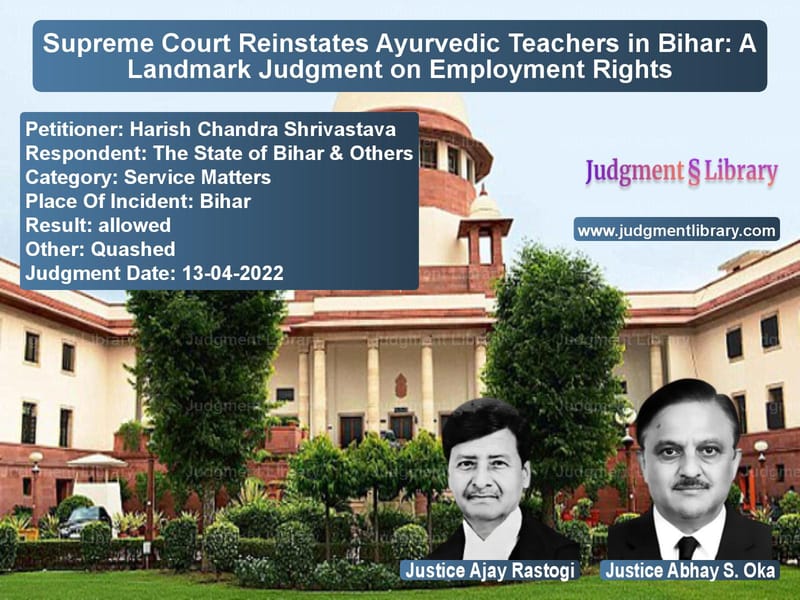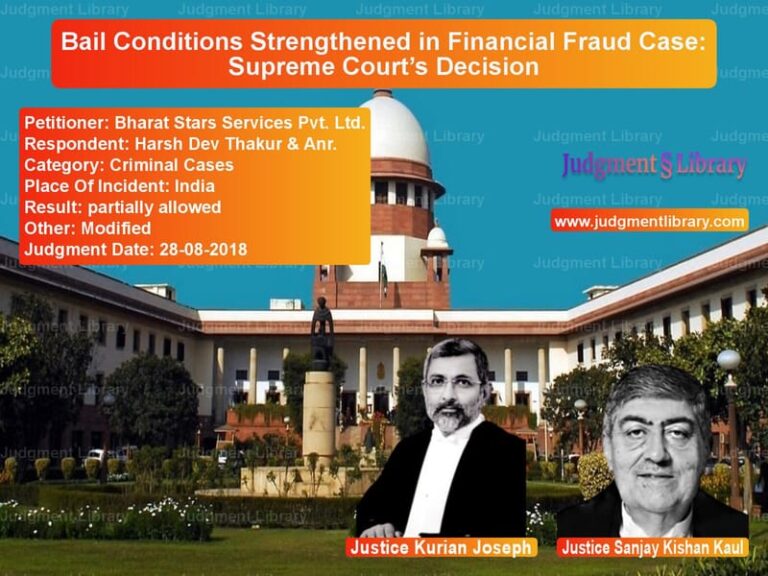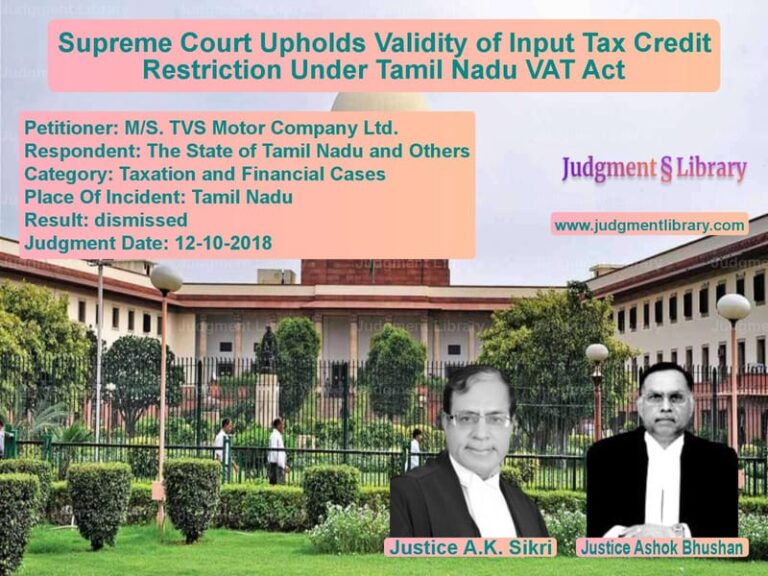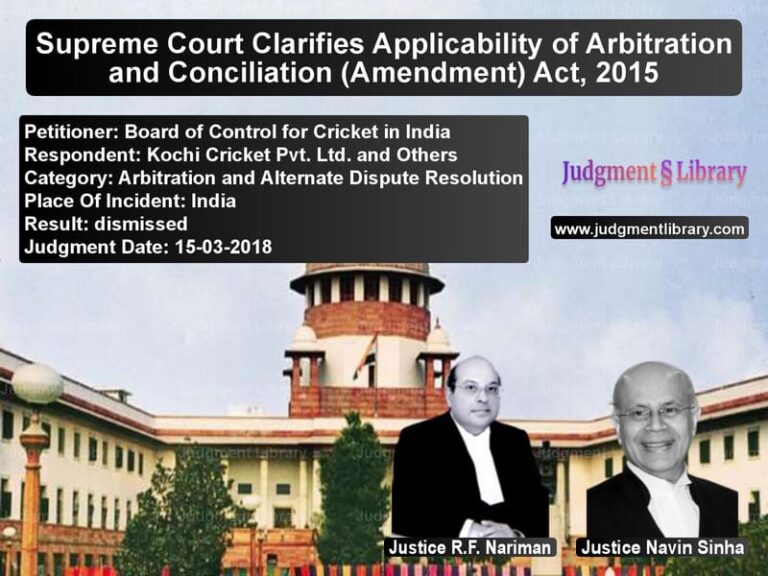Supreme Court Reinstates Ayurvedic Teachers in Bihar: A Landmark Judgment on Employment Rights
The Supreme Court of India, in the case of Harish Chandra Shrivastava vs. The State of Bihar & Others, delivered a crucial judgment on the absorption of Ayurvedic teachers in Bihar. The case revolved around the termination of teaching staff after the State Government took over private Ayurvedic colleges. The Court reinstated the appellants, recognizing their service and directing the government to grant pensionary benefits.
Background of the Case
The appellants, who held degrees in Ayurveda, were appointed as Lecturers between March 14, 1978, and May 10, 1979, in private Ayurvedic colleges in Bihar. Over time, they were promoted to Reader/Professor. However, their appointments predated March 25, 1984, when the Bihar Government passed the Bihar Private Medical (Indian System of Medicine) College (Taking Over) Act, 1985. This Act allowed the state to take over private Ayurvedic colleges.
State Government’s Action
On June 1, 1986, the government took over Sri Dhanwantri Ayurvedic College, Buxar, and other institutions. To regularize employment, a Screening Committee was formed in 1990 to assess faculty qualifications. The committee’s report, published in 1992, led to the absorption of 103 teaching and non-teaching employees, including the appellants.
Challenges to the Screening Committee Report
- Several employees challenged the 1992 report, arguing it was flawed.
- The High Court ordered a fresh Screening Committee to reassess qualifications.
- The second Screening Committee, formed in 1995, submitted a report in 1999 that recommended the absorption of only 23 teachers.
Termination of Services
Based on the 1999 report, the government terminated 229 employees, including the appellants, on August 29, 2003. The terminated employees challenged this in the High Court.
Further Review and Final Rejection
A Review Screening Committee was constituted after High Court directions. It recommended the absorption of 24 teaching and 42 non-teaching employees, rejecting 99 employees, including the appellants. The High Court upheld this rejection, ruling that the appellants did not meet the minimum qualification criteria.
Arguments by the Parties
Appellants’ Arguments
- They had the required qualifications and had been serving since 1978-79.
- The notification of December 9, 1986, mandated evaluating eligibility as of June 1, 1986, not at the time of initial appointment.
- The High Court erred by considering qualifications at the time of appointment instead of the takeover date.
State Government’s Arguments
- As per the Central Council of Indian Medicine (CCIM) Act, 1970, the appellants did not have the required three years of post-qualification teaching experience at the time of their initial appointment.
- The Screening Committee’s assessment was in line with government policies.
- Only those who met the qualification criteria under CCIM regulations were eligible for absorption.
Supreme Court’s Observations
The Court ruled in favor of the appellants, making the following key observations:
- The December 9, 1986, notification clearly stated that eligibility should be assessed as of June 1, 1986.
- The High Court had misinterpreted the law by evaluating qualifications as of the initial appointment date instead of the takeover date.
- The appellants had completed more than three years of teaching experience by June 1, 1986, making them eligible for absorption.
- The government’s action of terminating their services was legally flawed.
Final Judgment
The Supreme Court quashed the High Court’s decision and ordered the reinstatement of the appellants. The key directions included:
- Dr. Mod Nath Mishra, who had not reached retirement age, was to be reinstated within a month.
- Other appellants, who had retired, would be treated as having served continuously.
- Pension and other retiral benefits must be granted within three months.
- Failure to comply would result in 12% annual interest on arrears.
Implications of the Judgment
For Government Employees
- The ruling safeguards the rights of employees absorbed into government service after privatization.
- It sets a precedent ensuring that eligibility criteria are evaluated correctly.
For Future Screening Committees
- Committees must follow legal mandates and assess eligibility based on cutoff dates.
- Employees cannot be denied absorption based on arbitrary criteria.
For Employment Law
- The judgment ensures that due process is followed in employment disputes.
- It prevents the government from wrongfully terminating employees without due cause.
Conclusion
The Supreme Court’s judgment in Harish Chandra Shrivastava vs. The State of Bihar is a landmark decision in service law. By ordering reinstatement and pensionary benefits, the Court reinforced the principles of fairness and justice in government employment. This ruling serves as a precedent for similar cases, ensuring that employees are not arbitrarily deprived of their rights.
Petitioner Name: Harish Chandra Shrivastava.Respondent Name: The State of Bihar & Others.Judgment By: Justice Ajay Rastogi, Justice Abhay S. Oka.Place Of Incident: Bihar.Judgment Date: 13-04-2022.
Don’t miss out on the full details! Download the complete judgment in PDF format below and gain valuable insights instantly!
Download Judgment: harish-chandra-shriv-vs-the-state-of-bihar-&-supreme-court-of-india-judgment-dated-13-04-2022.pdf
Directly Download Judgment: Directly download this Judgment
See all petitions in Employment Disputes
See all petitions in Termination Cases
See all petitions in Public Sector Employees
See all petitions in Judgment by Ajay Rastogi
See all petitions in Judgment by Abhay S. Oka
See all petitions in allowed
See all petitions in Quashed
See all petitions in supreme court of India judgments April 2022
See all petitions in 2022 judgments
See all posts in Service Matters Category
See all allowed petitions in Service Matters Category
See all Dismissed petitions in Service Matters Category
See all partially allowed petitions in Service Matters Category







